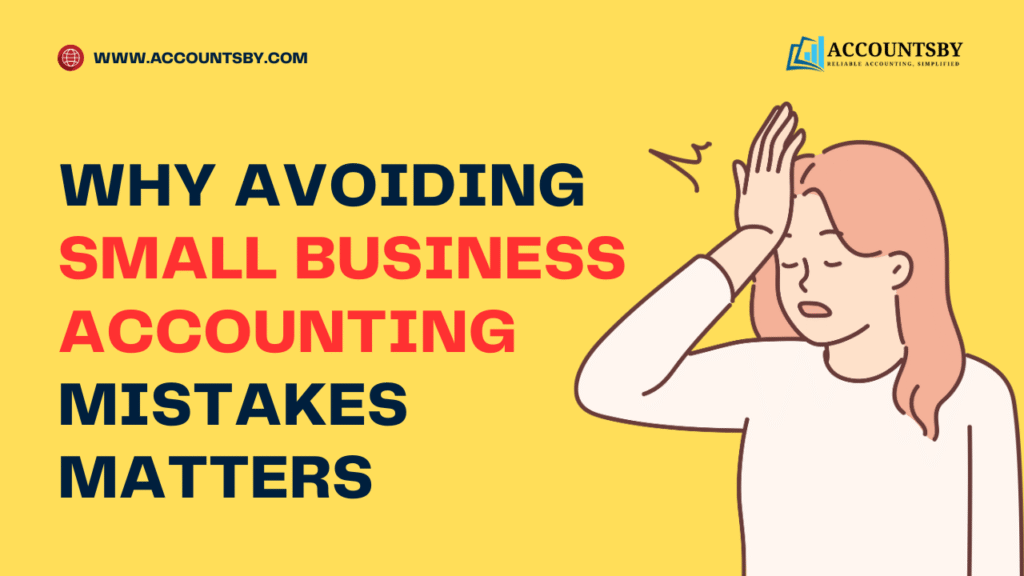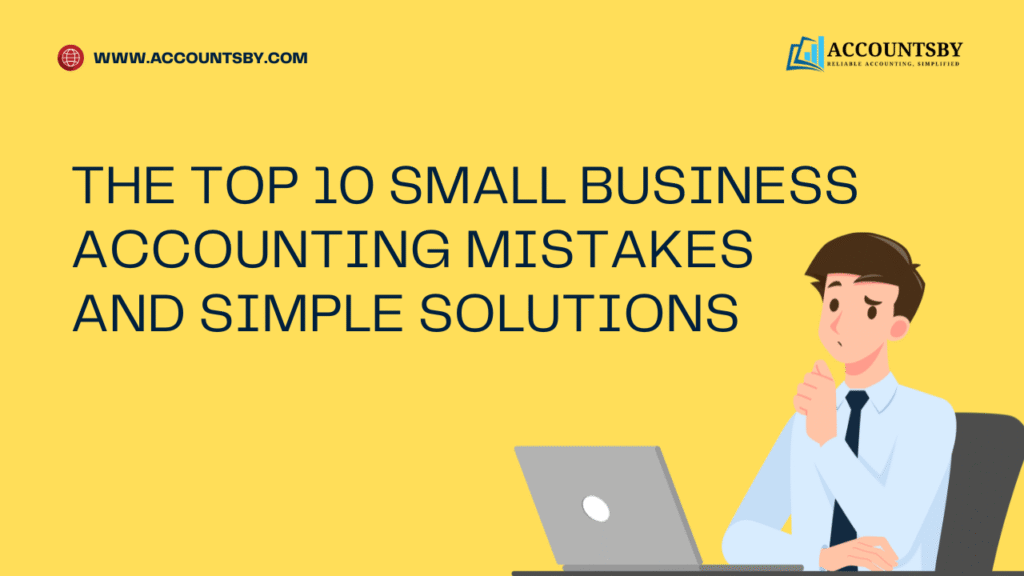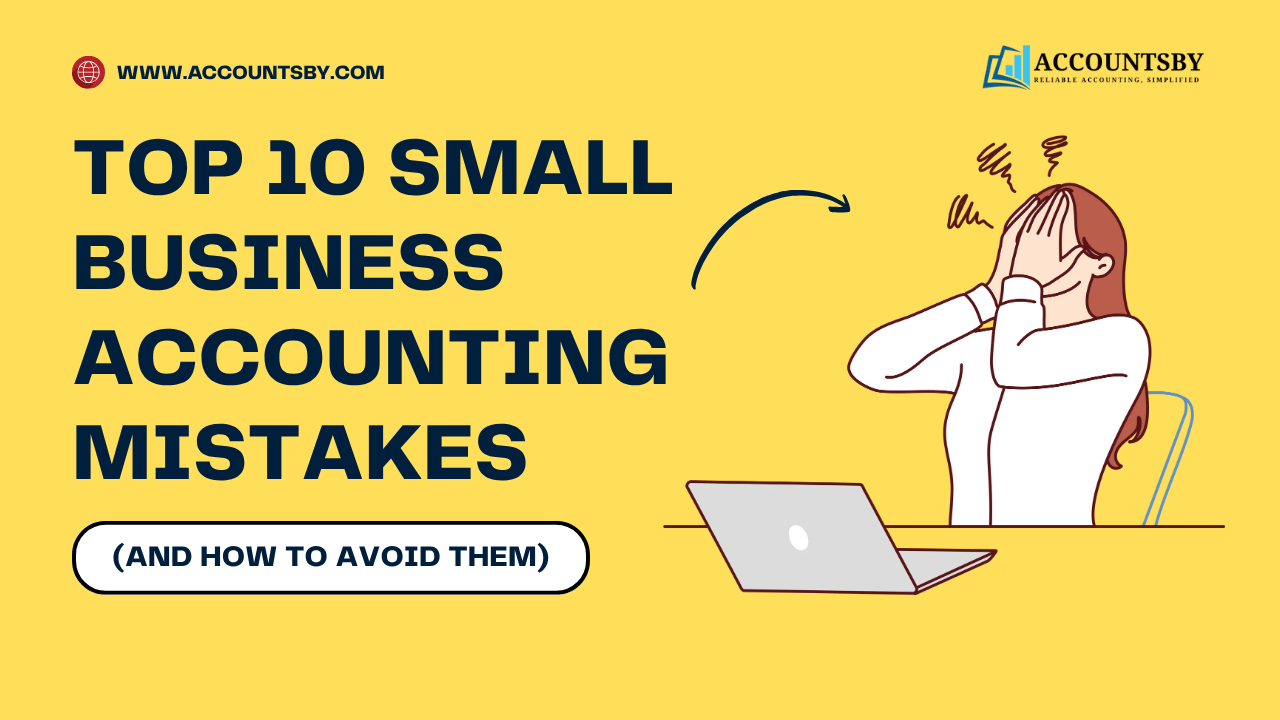Starting and running a small business is exciting, but managing your money can be tricky. Many new business owners make common errors that can lead to big problems later on. Understanding small business accounting mistakes is key to keeping your finances healthy and growing your venture.
This guide will walk you through the top 10 small business accounting mistakes and give you simple, actionable accounting tips for startups to help you avoid them. By sidestepping these common financial errors and practicing smart freelance accounting, you can ensure your business stays on a strong financial footing.
Why Avoiding Small Business Accounting Mistakes Matters

Your business’s financial health depends on accurate record-keeping. Even small bookkeeping errors can snowball into bigger issues, like wrong tax payments, cash flow shortages, or missed growth opportunities. Good financial habits from day one are crucial for any successful small business or startup in India.
Let’s dive into the most common small business accounting mistakes and how you can easily fix or avoid them.
The Top 10 Small Business Accounting Mistakes and Simple Solutions

1. Mixing Personal and Business Money
This is probably the most common mistake! Using your personal bank account or credit card for business expenses (and vice-versa) creates a tangled mess.
- Why it’s a mistake: It makes it super hard to track your actual business profit, complicates tax filing, and can even put your personal savings at risk if your business faces legal issues.
- How to avoid it: Open a separate bank account and get a dedicated credit card just for your business. Pay yourself a fixed salary or drawing from the business account. This clear separation is one of the best accounting tips for startups.
2. Not Keeping Track of All Your Money In and Out
Many small business owners only look at their bank balance, not realizing where their money is truly going or coming from.
- Why it’s a mistake: You lose sight of your cash flow. You might run out of money when you least expect it, or miss out on noticing if certain expenses are too high. This is a major source of common financial errors.
- How to avoid it: Record every transaction – big or small. Use simple freelance accounting software (like Zoho Books, Tally, or QuickBooks) or even a simple spreadsheet to log all income and expenses immediately.
3. Forgetting to Track Small Expenses
It’s easy to overlook small cash purchases like stationery, coffee with a client, or bus fares. But these add up!
- Why it’s a mistake: You miss out on potential tax deductions, leading to you paying more tax than needed. Your financial reports also won’t be accurate.
- How to avoid it: Get into the habit of recording every single expense. Use a mobile app to snap pictures of receipts instantly, or keep a small notebook for cash transactions.
4. Not Checking Your Bank Statements Regularly (Reconciliation)
Simply put, bank reconciliation means comparing your business bank statements with your own records (your “books”) to make sure they match.
- Why it’s a mistake: You might miss bank errors, accidental duplicate payments, or even fraudulent charges. Your internal records could be wrong, leading to bad business decisions. This is a huge bookkeeping error.
- How to avoid it: Set aside time each month to reconcile your bank accounts. Most accounting software has tools to automate this, making it much easier.
5. Delaying Invoicing and Chasing Payments
Waiting too long to send invoices or not following up on unpaid bills can severely hurt your business’s cash flow.
- Why it’s a mistake: You might not have enough money to pay your own bills or employees on time. Unpaid bills are like money lost.
- How to avoid it: Send invoices as soon as work is done. Use invoicing software that sends automated reminders to clients. Have clear payment terms and don’t be afraid to politely follow up on overdue payments.
6. Not Planning for Taxes Early Enough
Many small business owners get a shock when tax season comes because they haven’t saved enough.
- Why it’s a mistake: You could face late fees and penalties, and it puts a huge strain on your business cash flow. One of the most critical common financial errors for new businesses.
- How to avoid it: Set aside a percentage of your income for taxes right from the start. Many experts suggest putting away 20-30% of your earnings. Keep a tax calendar to know all deadlines for GST, TDS, and income tax.
7. Misclassifying (Wrongly Labeling) Expenses
Putting an expense into the wrong category (e.g., calling a new laptop “office supplies” instead of “equipment”) can mess up your financial reports.
- Why it’s a mistake: Your financial reports won’t give you a true picture of your business’s spending, making it hard to see where you can save money. It can also lead to tax problems.
- How to avoid it: Learn basic accounting categories or use accounting software with predefined categories. If unsure, always ask a professional. This prevents many bookkeeping errors.
8. Not Backing Up Your Financial Data
Imagine losing all your records due to a computer crash or an accidental deletion. Nightmare!
- Why it’s a mistake: Losing financial data can lead to huge problems with taxes, audits, and simply understanding your business’s history.
- How to avoid it: Use cloud-based accounting software (like Zoho Books, TallyPrime with Tally on Cloud, or QuickBooks Online) that automatically backs up your data. If you use offline software, regularly save copies of your files to a cloud service or external hard drive.
9. Trying to Do Everything Yourself (Without Expert Help)
While saving money is important, trying to handle all your accounting without proper knowledge can cost you more in the long run.
- Why it’s a mistake: You might make costly bookkeeping errors, miss important tax deductions, or misunderstand complex tax laws. This can lead to penalties and bad financial decisions.
- How to avoid it: As your business grows, consider hiring a professional accountant or bookkeeper. Even for startups, a few hours of professional advice can save you from major common financial errors.
10. Ignoring Cash Flow Management
Focusing only on how much profit you made on paper, rather than how much cash you actually have, is a recipe for disaster.
- Why it’s a mistake: You might be profitable but still run out of cash to pay daily bills if your clients are slow to pay you, or if you made a big purchase. Lack of cash flow is a leading cause of small business failure.
- How to avoid it: Regularly check your cash flow statement (how money comes in and goes out). Forecast your future cash flow by estimating upcoming income and expenses. Keep an emergency fund to cover unexpected costs. This is a vital accounting tip for startups.
The Bottom Line on Avoiding Small Business Accounting Mistakes
By understanding these small business accounting mistakes and actively working to avoid them, you can build a solid financial foundation for your business. Good freelance accounting practices, like keeping detailed records, using dedicated accounts, and embracing technology, are your best allies. Don’t let common financial errors derail your dreams. With these accounting tips for startups, you’ll be well on your way to financial success!
Need More Help? Check These Resources:
- Income Tax Department, Government of India: For official tax rules and forms. www.incometax.gov.in
- ClearTax / Zoho Books / Tally / QuickBooks: Popular platforms offering accounting software and tax guidance for small businesses in India.
- Professional Accountants/CAs: For personalized advice and hands-on help with your business finances.




